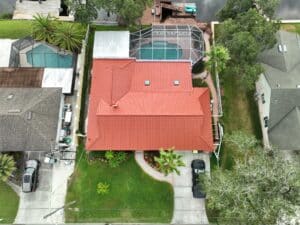Metal Roofing: Installation Ease
Installing metal roofing can be significantly easier compared to traditional roofing materials, especially in the Florida climate. Here’s a closer look at why:
- Lightweight: Metal roofing materials are typically much lighter than traditional options like asphalt shingles or tiles. This lightweight nature makes them easier to handle and transport, reducing the strain on contractors during installation.
- Interlocking Panels: Metal roofing often comes in interlocking panels, which simplifies the installation process. These panels are designed to fit together seamlessly, reducing the need for complex cutting and fitting on-site.
- Fewer Components: Metal roofing systems generally have fewer components compared to traditional roofing materials. This means less time spent on installation, as there are fewer elements to manage and install.
- Flexible Installation Options: Metal roofing can be installed on a variety of roof slopes and configurations, offering flexibility to contractors. This adaptability makes it easier to work with different roof designs and styles.
- Faster Installation: Due to its lightweight nature, interlocking panels, and fewer components, metal roofing can often be installed more quickly than traditional roofing materials. This can result in cost savings for both contractors and homeowners.
In the Florida climate, where weather conditions can be unpredictable, the ease and speed of installation offered by metal roofing can be a significant advantage for contractors. It allows them to complete projects more efficiently and effectively, while also providing homeowners with a durable and reliable roofing solution.
Traditional Roofing Materials: Installation Challenges
While traditional roofing materials like asphalt shingles and tiles are common choices for Florida projects, they come with their own set of installation challenges that contractors must navigate:
- Weight: Traditional roofing materials can be heavy, especially when considering the cumulative weight of materials for larger projects. This weight can make transportation and handling more challenging, requiring additional labor and equipment.
- Fragility: Asphalt shingles and tiles can be fragile, particularly during installation. Care must be taken to avoid breakage, which can slow down the installation process and increase costs.
- Complexity of Installation: Traditional roofing materials often require more complex installation processes compared to metal roofing. This can include cutting and fitting individual pieces, as well as ensuring proper alignment and sealing.
- Weather Sensitivity: Traditional roofing materials can be more sensitive to weather conditions during installation. Rain or high humidity can affect the adhesives and sealants used, potentially compromising the integrity of the roof.
- Maintenance Requirements: Some traditional roofing materials may require more frequent maintenance compared to metal roofing. This can include periodic inspections, repairs, and replacements, adding to the long-term cost of ownership.
Despite these challenges, traditional roofing materials remain popular choices for many Florida homeowners. However, contractors must be aware of these challenges and be prepared to address them effectively to ensure a successful installation.
Metal Roofing: Durability and Longevity
One of the key advantages of metal roofing, particularly in the Florida climate, is its exceptional durability and longevity. Here’s why metal roofing stands out in this regard:
- Weather Resistance: Metal roofing is highly resistant to the elements, including heavy rain, strong winds, and hail, which are common in Florida. Metal roofs are designed to withstand these conditions without deteriorating or sustaining damage.
- Corrosion Resistance: Metal roofing materials are treated or coated to resist corrosion, which is particularly important in Florida’s humid climate. This corrosion resistance helps maintain the integrity of the roof over time.
- Long Lifespan: Metal roofing is known for its long lifespan, often lasting 50 years or more with proper maintenance. This longevity far exceeds that of many traditional roofing materials, making it a cost-effective choice in the long run.
- Impact Resistance: Metal roofing is also highly resistant to impact, such as from falling branches or debris during storms. This can help prevent damage to the roof and prolong its lifespan.
- Minimal Maintenance: Compared to traditional roofing materials, metal roofing requires minimal maintenance. Routine inspections and occasional cleaning are typically all that’s needed to keep a metal roof in top condition.
- Energy Efficiency: Metal roofing can also be more energy-efficient than traditional roofing materials, especially when coated with reflective paint. This can help reduce energy costs for homeowners in Florida, where air conditioning is often a significant expense.
Traditional Roofing Materials: Maintenance Requirements
Traditional roofing materials, such as asphalt shingles and tiles, often require more frequent maintenance compared to metal roofing. Here are some key maintenance requirements associated with traditional roofing materials:
- Regular Inspections: Asphalt shingles and tiles should be inspected regularly for signs of damage, such as cracks, curling, or missing pieces. These issues can arise due to weather exposure or natural wear and tear.
- Repair and Replacement: Damaged or missing shingles and tiles should be repaired or replaced promptly to prevent water infiltration and potential structural damage. This can involve removing the damaged material and installing new shingles or tiles.
- Cleaning and Debris Removal: Leaves, branches, and other debris should be regularly cleared from the roof to prevent water buildup and potential damage. Additionally, moss and algae growth should be treated and removed to prevent damage to the roofing material.
- Sealing and Coating: Some traditional roofing materials may require periodic sealing or coating to maintain their integrity and weather resistance. This can help prolong the lifespan of the roof and prevent leaks.
- Gutter Maintenance: Gutters should be cleaned regularly to ensure proper drainage and prevent water damage to the roof and the home’s foundation. Clogged gutters can lead to water backup and potential roof leaks.
- Professional Maintenance: Regular professional inspections and maintenance can help identify and address potential issues before they become major problems. Professional roofers can provide expert advice on maintaining traditional roofing materials and ensure the roof remains in top condition.
While traditional roofing materials can provide a durable and attractive roofing solution, they do require more maintenance compared to metal roofing. Contractors working with traditional roofing materials should be aware of these maintenance requirements and educate their clients on the importance of regular maintenance to prolong the lifespan of their roof.
Metal Roofing: Energy Efficiency
Energy efficiency is a significant consideration for homeowners in Florida, where hot and humid weather can lead to high cooling costs. Metal roofing offers several advantages in terms of energy efficiency:
- Reflectivity: Metal roofing reflects solar radiant heat, which can help keep the interior of the home cooler. This can reduce the need for air conditioning and lower energy bills.
- Insulation: Metal roofing can be installed with insulation underneath, further enhancing its energy efficiency. This insulation helps to prevent heat transfer, keeping the home more comfortable and reducing energy usage.
- Longevity: The long lifespan of metal roofing means that homeowners can enjoy energy savings over many years. Unlike traditional roofing materials that may degrade over time, metal roofing maintains its energy-efficient properties throughout its lifespan.
- Environmentally Friendly: Metal roofing is a sustainable choice for environmentally conscious homeowners. Its energy-efficient properties can help reduce the home’s carbon footprint by decreasing energy consumption.
- Cool Roofing: Metal roofing can also be designed as a “cool roof,” which meets certain energy efficiency standards. Cool roofs are designed to reflect more sunlight and absorb less heat, keeping the roof and the home cooler.
Overall, metal roofing’s energy-efficient properties make it an attractive choice for homeowners in Florida looking to reduce their energy bills and environmental impact. Contractors can highlight these benefits to homeowners as part of their roofing solutions, offering a sustainable and cost-effective option for their projects.
Traditional Roofing Materials: Customer Satisfaction
Customer satisfaction with traditional roofing materials can vary depending on various factors, including durability, aesthetics, and maintenance requirements. Here are some key considerations from a contractor’s perspective:
- Durability: While traditional roofing materials can provide adequate durability, they may be more prone to damage from weather conditions and require more frequent maintenance compared to metal roofing.
- Aesthetics: Traditional roofing materials, such as asphalt shingles and tiles, offer a wide range of colors and styles to suit different architectural designs. This variety can be appealing to homeowners looking for a specific aesthetic for their homes.
- Maintenance Requirements: The maintenance requirements of traditional roofing materials can be a concern for some homeowners. Regular inspections and repairs may be needed to ensure the roof remains in good condition, which can add to the long-term cost of ownership.
- Perceived Value: Some homeowners may perceive traditional roofing materials as offering a higher value or prestige compared to metal roofing. This perception can influence their decision-making process when choosing a roofing material for their home.
- Long-Term Performance: Despite the maintenance requirements, traditional roofing materials can provide reliable performance over time. With proper care, these roofs can last for many years and provide homeowners with peace of mind.
Metal Roofing: Cost Considerations
When comparing metal roofing to traditional roofing materials, cost is an important factor to consider. Here are some key cost considerations from a contractor’s perspective:
- Initial Cost: Metal roofing typically has a higher initial cost compared to traditional roofing materials. The cost of materials and installation can be higher, which can be a deterrent for some homeowners.
- Long-Term Savings: Despite the higher initial cost, metal roofing can offer long-term savings. Its durability and longevity mean that homeowners may save money on repairs and replacements over time, as well as energy costs due to its energy-efficient properties.
- Maintenance Costs: Metal roofing generally requires less maintenance compared to traditional roofing materials. This can result in lower maintenance costs over the life of the roof, further contributing to long-term savings.
- Resale Value: Metal roofing can also enhance the resale value of a home. Its durability and energy-efficient properties can be attractive to potential buyers, potentially increasing the resale value of the home.
- ROI: When considering the overall return on investment (ROI), metal roofing can be a cost-effective choice for homeowners. While the initial cost may be higher, the long-term savings and potential increase in home value can make it a worthwhile investment.
In conclusion, while metal roofing may have a higher initial cost compared to traditional roofing materials, its durability, energy efficiency, and long-term savings potential make it a compelling choice for homeowners in Florida. Contractors can help educate homeowners about these cost considerations to help them make informed decisions about their roofing options.
Choosing the right roofing material for Florida projects is a crucial decision for contractors. While traditional roofing materials like asphalt shingles and tiles offer their own advantages, metal roofing stands out in terms of installation ease, durability, energy efficiency, and long-term savings. Understanding these key differences can help contractors make informed decisions and provide their clients with the best roofing solutions for their needs.
Are you ready to explore the benefits of metal roofing for your Florida projects? Contact Elite Steel today at Elite Steel to learn more about our metal roofing options. With our high-quality products and expert advice, we can help you provide your clients with durable, energy-efficient roofing solutions that stand the test of time.


